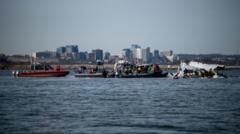Air traffic control staffing was deemed "not normal" during the tragic mid-air collision that occurred in Washington DC between a military helicopter and a passenger plane, resulting in the loss of 67 lives. Transportation Secretary Sean Duffy confirmed reports of understaffing at the Reagan National Airport control tower at the time of the incident, suggesting a government oversight.
According to various media sources, one air traffic controller was responsible for coordinating both helicopters and aircraft, a task typically requiring two staff members. Duffy indicated that this understaffing would be part of the ongoing investigation and review process. He emphasized the importance of adhering to Federal Aviation Administration (FAA) procedures and questioned whether air traffic controllers had effectively managed the flow of traffic during that critical time.
Moreover, it was reported by Board Member Todd Inman of the National Transportation Safety Board (NTSB) that just prior to the crash, the helicopter was flying at roughly 200 feet, the maximum allowable altitude for helicopters near Reagan National Airport. Duffy also raised concerns regarding the decision to conduct military operations in a densely populated airspace during peak hours. "Why would they fly a mission at nine o'clock at night through really busy air space... instead of at one o'clock in the morning?" he questioned.
Investigators are currently sifting through various factors that could have contributed to this disaster, but official conclusions have yet to be drawn. The ill-fated American Airlines flight had 64 passengers on board when it collided with an Army Black Hawk helicopter transporting three soldiers, with no survivors.
Duffy pointed out that the US faces a chronic shortage in the air traffic control workforce, with reports indicating that over 90% of control facilities are understaffed according to FAA recommendations. He acknowledged the pressing need for increased staffing and highlighted the strain on current air traffic controllers, stating "they're stressed out. They're tapped out. They're overworked."
As Duffy collaborates with the FAA to develop a strategy to rectify these staffing issues, he cautioned that improvements would not happen overnight. "You can’t flip a switch and get air traffic controllers here tomorrow," he explained.
Amid this tragedy, family members of those lost gathered on site to pay their respects, a somber reminder of the human cost behind operational failures in the aviation sector.






















